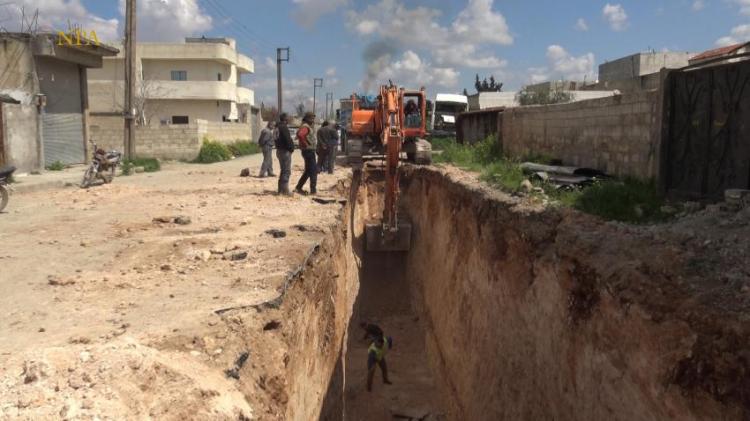Fattah Isa\ Gihad Nabo – Kubani
The people of Kubani city, who were affected by the implementation of the project, “the stream”, which is the largest service project implemented in the northeastern of Syria, because the municipality delayed to inform the citizens of the need to evacuate homes to be demolished, in order to complete the implementation of the project.
The city of Kubani was hit by floods, the most intense of which was on May the 12th, 2018, led to the destruction of more than 30 houses and the damage of more than 50 others, most of them were in Butan Gharbi district.
The municipality of the city acknowledged the delay in informing the affected people of the Project, which is implemented by the municipality in cooperation with the Strategic Studies Center, in Aljazeera region (far northeast of Syria).
The Project, which is one of the largest Projects in the region and presented by the municipality of Kubani with the Self-Administration’s budget, announced employment vacancies for the people of the city. The Project employs more than 120 workers in various industrial workshops.
Mustafa Isa, who lives with his family members and makes his living daily from his shop, will have to give up his house and shop within one month, until the Project is completed, after he was compensated by the municipality for the damage affected him .
Isa told North Press that he bought the land, of which the property was built on, 35 years ago, and according to the municipality’s chart, the property was classified as “An arboretum”. Although the property was there before the war of 2014, against the organization of the Islamic State, In the city, however, the three floors collapsed due to the war.
Isa added that he had authorized the construction of the property, when he returned, after he was displaced, yet, the municipality had informed him, suddenly, of the need to evacuate the house within a month, to continue their Project. Isa pointed out that the municipality had to inform them four months before, At least, so that they could find a solution to their problem. Nevertheless, the amount of the compensation was not fair to him, and that the land granted is much less than his property’s value.
The reason for their delay in informing the people, whose buildings and houses will be demolished ,is because of the sudden approval (by the Finance Committee of the Administration of the budget) for the Project, which costs in the first phase about 2 million dollars, or one billion Syrian pounds. Said, Fares A’ti, the co-chair of People’s municipality in Kubani
there are four houses located on the stream were compensated, to begin the removal process, pointing out that these houses and buildings were built in the area of irregularities (green belt – garden). A’ti explained.
The primer officer in Kubani said that the Self-Administration adopted the Project, because the budget of the municipality is not enough to carry out such projects, adding that the first phase of the project extends for a length of 3.5 km, starting from the orphanage and ending with “Kania Cordan” neighborhood.
The mayor said that 60% of excavation works and 30% of the concrete works were carried out. He pointed out that the final phase of the project includes the construction of a dam in Kania Kordan east of the city, to store about 60 billion liters of water for irrigation.
The owner of (Joan) store, in Alsina’a area, Abdulsalam Sheikho, criticized the slow implementation of the project, which cut off major roads in the city, causing a transport crisis, especially, for the residents and workers in that area. Furthermore, Sheikho criticized the failure of the municipality and the operator to put signs near the project implementation places, which caused additional troubles to citizens.
Engineer Nayef Jamal Khalli, the project’s implementation supervisor, said, there is no delay in the implementation process, pointing out that 75 workers function in carpentry workshops and 15 others for solving infrastructure problems. The project is being implemented from two sides within the city.
Khalli explained that the problem of cutting the roads was caused by the fact that “the concrete can be filled and passed on after 28 days, which led to a congestion in the city, and the road will be opened again in a week.
Khalli assured that the Project is the first of its kind in the north and east of Syria, in terms of cost and length, noting that the Project started on the 24th of February 2019 and will last for about four months. Moreover, the second phase of the project includes a 6-kilometer course at a cost of 2 million dollars, in the western line, while the third phase includes the construction of a dam, with a capacity of 60-million-cubic-meter to be used for agriculture.

